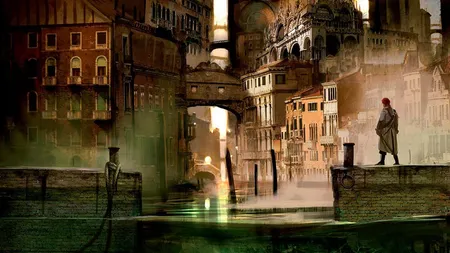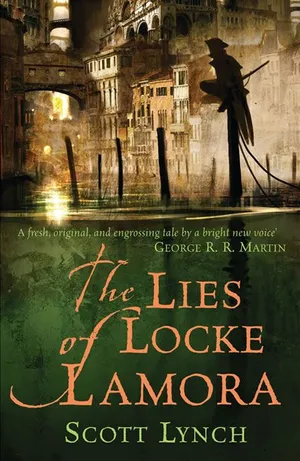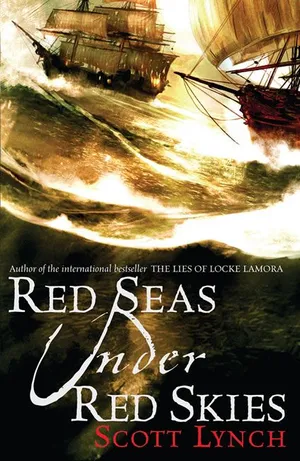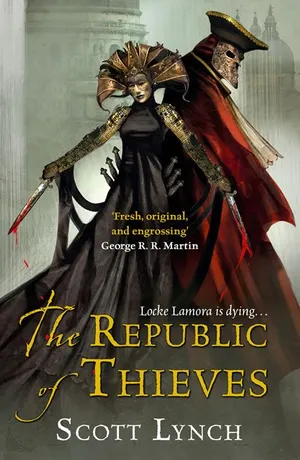Books I Love: The Gentleman Bastards Series
TL;DR: I have difficulty expressing how much I love Scott Lynch’s The Lies of Locke Lamora and all the other books in the Gentleman Bastards series. They’re fantastically well-constructed and funny heist stories.

I have difficulty expressing how much I like The Lies of Locke Lamora and the other books in the Gentleman Bastards series. They’re fantastically well-constructed heist stories. And they’re so funny I frequently found myself reading sections aloud to Annie until she decided to read it herself.
Here’s a brief excerpt from the first chapter, when the Thiefmaker (who runs an Oliver Twist-style establishment training young orphans to become successful thieves) is trying to convince the Eyeless Priest to take a problematic young pickpocket off his hands.
The Thiefmaker tried to let a vaguely sincere expression scurry onto his face, where it froze in evident discomfort. His shrug was theatrically casual. “There are, ah, problems with the boy, yes. But the problems are unique to his situation in my care. Were he under yours, I’m sure they would, ahhhh, vanish.”
“Oh. You have a magic boy. Why didn’t you say so?” The priest scratched his forehead beneath the white silk blindfold that covered his eyes. “Magnificent. I’ll plant him in the fucking ground and grow a vine to an enchanted land beyond the clouds.”
“Ahhhhh! I’ve tasted that flavor of sarcasm before, Chains.” The Thiefmaker gave an arthritic mock bow. “That’s the sort you spit out as a bargaining posture. Is it really so hard to say that you’re interested?”
The Eyeless Priest shrugged. “Suppose Calo, Galdo, and Sabetha might be able to use a new playmate, or at least a new punching bag. Suppose I’m willing to spend about three coppers and a bowl of piss for a mystery boy. But you’ll still need to convince me that you deserve the bowl of piss. What’s the boy’s problem?”
“His problem,” said the Thiefmaker, “is that if I can’t sell him to you, I’m going to have to slit his throat and throw him in the bay. And I’m going to have to do it tonight.”
You can probably guess that the young boy grows up to be the title character, Locke Lamora. The books alternates chapters between flashbacks to his childhood and his adventures as the head of the Gentleman Bastards, a crew of unusually gifted young thieves. The heists they pull become increasingly elaborate as they grow up. And like all good heist movies, the fun really starts when it’s clear that Locke and his team are in over their heads.



I love the setting. The world these novels describe is unlike any other fantasy setting I’ve read. Like Bladerunner or Star Wars, it evokes the grimy, lived-in feeling of a city in a world that existed long before this story and will exist long after. Magic exists, but for reasons I won’t spoil, it’s uncommon. Instead, the fantastic elements are provided mainly by alchemy, which is widespread and stands in for science and technology.
Even more remarkable, religion exists, and not as a transparent re-skinning of real-world theologies. I’ve found that most fantasy either depicts a Christian-style monotheistic faith that all right-thinking people follow (see Narnia), or a casual nod to polytheism in a world where most people are openly noncommital, making it feel more like a modern secular society (see Game of Thrones).
Locke is a priest of the Nameless Thirteenth, the god of thieves and criminals, and a secret member of the pantheon. Locke’s faith is not an easy thing. It’s a non-trivial part of his life, and informs the decisions he makes, even to his own detriment.
I can’t write much about the characters without edging into spoiler territory, but suffice to say that I found myself deeply invested in their lives. Locke and his crew grew up together, and are the only family they have. Their relationships are challenging and loving and frustrating all at once. They have the kind of easy banter and well-worn conflicts that only come from living uncomfortably close together for many years.
And, of course, there’s the dialogue. As you saw from the short excerpt, the way the characters in these books talk is something special. At it’s best, it feels like an episode of the West Wing. The characters fairly burst off the page. I would pay good money to see Guy Ritchie direct a Locke Lamora movie. I think his rapid-fire gangster dialogue would be a perfect match for Locke and his crew.
At the end of the day, I can’t say enough good things about these books. Locke and his friends are some of my favorite characters, and they live in a fantastical world that feels grounded and lived-in. I can’t wait for the next book.
(Oh, by the way, I would be remiss not to mention Pat Rothfuss’ legendary review of The Lies of Locke Lamora, where he compares it to his own book, and says that Scott’s has a better title, a better beginning, and better swearing.)